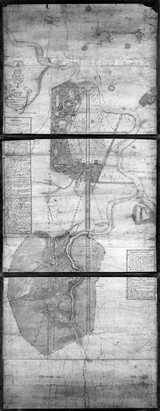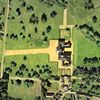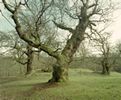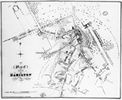 |
||||||||
| Layout of Hamilton Palace Gardens (site), Hamilton, South Lanarkshire, by Alexander Edward, 1708 | ||||||||
 © Lennoxlove House Ltd |
Hamilton Palace stood at the hub of an extensive formal garden landscape which had a great north-south avenue as its main axis. Probably originating in the late 17th century, the scheme was first clearly embodied in this garden layout drawn up in 1708 by Alexander Edward, architect (1651-1708), whose design may well have been influenced by other great formal gardens, including those of Versailles and Marly, with which he was familiar. This large drawing, dated 31 August 1708, less than three months before Edward's death in November, is entitled 'A map with some alterations and additions to the walks, courts, avenues, plantations and inclosures of Hamilton', suggesting perhaps that it may have been partly based on an existing layout. The plan and the key show what was then a novel concern for open views across the surrounding countryside, many of the vistas terminating in distant buildings or natural features. In addition to the great avenue, the plan also shows a complex of hunting rides and avenues in the woodlands to the north-west (top left) and south-west (bottom left) of the estate, arranged radially around star-shaped 'etoiles'. In the immediate vicinity of the palace there is an elaborate pattern of plantations, orchards and gardens, including two large parterres (ornamental gardens) on the north side of the building. Edward's layout formed the framework for later developments by his successors, most notably by William Adam (1689-1748), who introduced Ch‚telherault hunting lodge at an elevated point in the south avenue in the High Parks. To the north, it commanded a broad vista across the formal landscape of the Low Parks and, to the west, overlooked the wild forest of Cadzow around the gorge of the Avon Water. |
|||||||
|
|
|
|
|
|
|
|
|
|
 Detailed
view of the palace Detailed
view of the palace |
||||||||
 William
Pettigrew plan, 1813 William
Pettigrew plan, 1813 |
||||||||
 Cadzow Oaks |
 Engraving
by John Slezer Engraving
by John Slezer |
|||||||
|
|
|
|
|
|
|
|
|
|


